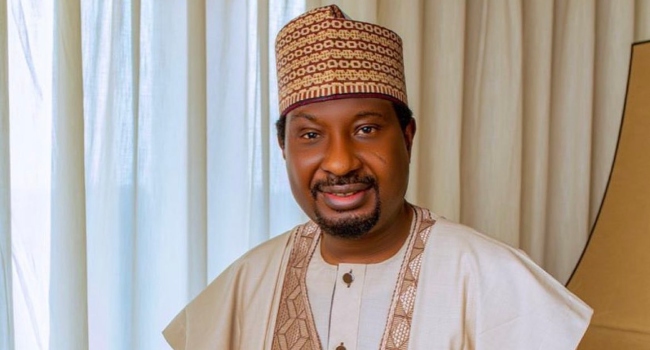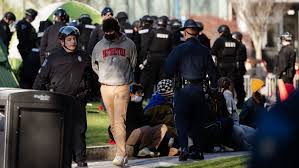Politics
2011: Prospects, Anxieties And Fears
Political analysts and scientists often liken democratic practice to an evolutionary process, which is usually slow, steady but assured.
The practice, they say, is however, laden with self-cleansing and regulatory mechanisms.
In the lead-up to the 2011 general elections that will involve 59 political parties; observers note that there is widespread anxiety among the citizenry about the polls because of recent developments such as assassinations and other politically motivated violence.
Many Nigerians will not forget in a hurry, the turbulence that has characterised the nation’s political terrain since independence, although they admit that a relative stability now prevails.
Observers, nonetheless, insist that the relative stability invariably imposes a challenge on the citizenry, particularly the politicians, to strive to sustain the durability of the fledging Republic.
“No doubt, the nation has risen from many of its endemic challenges that stalled our democratic growth since independence,” notes Dr Bola Ogunleye, a political scientist based in Abuja.
Right from the Fourth Republic, since 1991, some critical national issues have manifested, adding that many of the problems required commitment, patriotism and statesmanship to surmount.
“One good thing is that we have had two civilian administrations that succeeded themselves, though with some measure of turbulence, which is not alien to democratic practices,” Ahmed Shehu, a civil servant, says.
However, Mr Josiah Uwazuruonye, INEC’s Resident Electoral Commissioner (REC) for Anambra, advises Nigerians to strive to abide by the provisions of the 1999 Constitution and the Electoral Act, to achieve the dream of having credible elections in 2011.
In the same vein, former Governor Bola Tinubu Lagos State warns that only free, fair and transparent elections can lead Nigeria to the path of redemption.
Says Tinubu: “A credible election is the only guarantee for the country’s unity, stability and prosperity.’’
Apart from the views of concerned citizens over the forthcoming polls, many countries of the world, including the U.S. and Britain, have been calling for the conduct of flawless elections in Nigeria in 2011.
The U.S. Ambassador to Nigeria, Ms Robin Sanders, says that “a clean, unrigged and transparent election” in Nigeria is imperative, in line with contemporary expectations the world over.
She says that through the U.S.-Nigeria Bi-National Commission (BNC), her country hopes to offer technical assistance to Nigeria to achieve the lofty goal of organising a credible election.
The fears and viewpoints, notwithstanding, President Goodluck Jonathan has repeatedly assured Nigerians that he will ensure “electoral integrity” during the forthcoming elections.
While some observers say that electoral integrity does not exist in a vacuum, they, however, point to certain imperatives that would give it a realistic meaning.
“All stakeholders — INEC, politicians, political parties and even the electorate — must get their acts together and rightly too,” Ogunleye says, arguring that nation’s electoral process has always been a sore point in its march towards attaining a lasting democratic culture.
Ogunleye insists that the success of the Nigerian democracy hinges on three factors including the transparency of INEC, the conduct of politicians and political parties, as well as the functionality of the extant electoral laws.
Observers point out that the ‘one-man-one-vote’ campaign, initiated recently in Edo State by Governor Adams Oshiomhole, is instructive, as most citizens still feel that their votes never count in the election of their representatives due to their past experience.
“It is an essential fulcrum with which to move the wheels of democracy, says Joseph Idemudia, a political science student at the University of Abuja.
Apparently reinforcing such claims, Jonathan says: “We must develop a democratic culture in which the will of the people will be treated as sacred and immune to subversion by anti-democratic elements.”
In recent times, many Nigerian voters have developed apathy toward elections because of past frustrations, which include defective voter registers; trauma experienced on election days due to political violence as well as brazen rigging of elections.
“Either by omission or commission, INEC and the SIECs have been culpable in the subversion of the electoral process in the country, as they tolerated some unscrupulous officials in their employment,” says a rights activist, Ms Titi Adekunle.
ANPP’s National Director of Publicity, Mr Sabo Muhammed, wants Prof. Attahiru Jega, the new INEC Chairman, to “re-brand INEC by flushing out all bad eggs” in the commission as soon as possible.
However, INEC officials have defended their agency, insisting that some unscrupulous politicians and nonchalant voters are to blame for past electoral flaws.
Mr Emmanuel Umenger, INEC’s Director of Public Affairs, insists that “until the politicians do away with the do-or-die attitude over elections, the quest for a free and fair election would always be defeated.
“It is mandatory for other stakeholders to comply with the guidelines of electoral process and eschew violence for a successful election in 2011,” Umenger said.
Besides, Mr Aniedi Ikoiwak, a Resident Electoral Commissioner (REC) of INEC, says that efforts toward a credible 2011 elections require a purposeful collaboration between INEC and the citizens.
Ikoiwak concedes that the conduct of previous elections by INEC had been somewhat defective but stresses that the mistakes were never deliberate.
Some political parties and associations have made some proposals on how to ensure hitch-free elections in 2011. The Bauchi State chapter of the Conference of Nigerian Political Parties (CNPP) urges the Federal Government to bar all government officials from monitoring or supervising the 2011 elections.
“The ban should also cover the President, governors as well as national and state assembly members because the monitoring of elections by government officials in the past created a lot of suspicion and undue influence on the electorate.
Political analysts underscore the need to have a credible voter register for 2011 polls, arguing that a flawless register of voters is a requirement for credible elections.
Says Abdullahi: “The new INEC boss must take immediate steps to flag off the commencement of the update of the voter register because no credible election can be achieved without a credible and flawless voter register.” According to analysts, the conduct of politicians and political parties has been a source of concern in the quest for credible elections in Nigeria.
The REC in Anambra, Mr Josiah Uwazuruonye, says that the amendment of the Constitution and the Electoral Act will not necessarily solve the nation’s electoral problems if the human element in the electoral process is ignored. But another problem militating against Nigerian democracy, is the unwillingness of some politicians to readily concede defeats after contesting elections.
“It’s a culture that politicians must cultivate; whenever your opponent wins, you should be magnanimous enough to concede defeat,” says Miss Joyce Nwoye, a youth corps member.
Apart from the attitudinal factor, observers insist that the conduct of political parties has not been helpful, as most of the parties lack internal democracy in their affairs, particularly in the conduct of primaries.
According to Uwazuruonye, “once there is no internal democracy in the nomination and selection of candidates by political parties, there is no way the main election between the various political parties will be fair”.
Aside from these factors, the disposition of the voter is equally important and political analysts say that “the responsibility for a credible election is in the hands of every Nigerian. We should sensitise our people in schools, homes and offices to their civic responsibilities so as to achieve a credible election in 2011”.
However, many Nigerians and political parties have expressed optimism about a positive change in the country’s electoral process with the appointment of Jega as INEC’s Chairman.
The Social Democratic Mega Party (SDMP), describes Jega as a man with “a commitment to always do what is right”.
Prof. Pat Utomi is, however, quick to point out that problems confronting INEC are quite bigger than the person heading it, stressing that “INEC alone cannot deal with the systemic challenges facing the entire system.”
“The system is full of corruption and the ultimate solution still remains with the people becoming aware and determined to hold the system accountable,” he says.
Mr Yinka Odumakin, the spokesman for the “Save Nigeria Group’’ (SNG), and Chief Maxi Okwu, the National Chairman of the Citizens Popular Party (CPP), vouch for competence of the INEC Chairman in charting a purposeful roadmap for the success of the 2011 general elections.
But the Action Congress (AC) is cautious to comment on Jega’s appointment, as its National Publicity Secretary, Alhaji Lai Mohammed, says that the party is still studying the person of the new INEC Chairman.
In spite of the widespread anxiety in the country on the 2011 general elections, there is a cautious optimism that all will be well.
The citizens’ optimism is, however, hinged on the adoption of electoral reform strategies and other relevant mechanisms, as well as the avowed commitment of President Jonathan to holding credible polls.
The people express the hope that by 2011, Nigeria will be able to lift itself out of the electoral doldrums that have been the bane of the Nigerian democracy.
Ohain is of News Agency of Nigeria (NAN)
Celsus Ohain
Politics
Fubara Tasks Rivers Stakeholders On Political, Economic Emancipation …Commissions NAVAL Training Command Headquarters At Ebubu

Rivers State governor, Sir Siminalayi Fubara, has stated that the task of emancipating Rivers State and taking it to its desired height of development among the comity of Nigerian states depends on the concerted efforts of all stakeholders in the state.
Governor Fubara said this at Ubima, on Saturday, when he attended the burial ceremony of late Madam Cecelia Omehia, mother of Sir Celestine Omehia.
Addressing the leaders of the state who attended the burial ceremony in their numbers, the governor urged them to demonstrate their love for the state by living up to their patriotic responsibilities and make meaningful contributions that will move the state forward.
Governor Fubara reaffirmed his commitment to the service of the state and cautioned against politics of bitterness and animosity, stating that he will not govern the state as an underdog, nor compromise the interest of Rivers people, no matter the challenges facing his administration.
“Anybody who claims to love this State should not be party to anything, directly or indirectly, that will bring us backwards. We will continue to support every course that will advance the interest of our dear Rivers State.
“And I am happy to say, and I’ve said it over and again, it doesn’t matter the number of people that are standing with me, I will stand on the side of truth.
”I will not, I repeat, I will not govern our dear State on my knees. If that was the purpose, I will not do that. I will stand to govern our dear state and stand continually on the side of right”, he said.
The governor commiserated with the Omehia family over the transition of their beloved matriarch and urged them to take solace in the good legacies she left behind.
Sir Celestine Omehia, the chief mourner, in his response thanked the Rivers State governor and his entourage for honoring the memory of his beloved mother, whom he described as a role model, teacher and great disciplinarian.
Earlier on Saturday, Governor Fubara visited the scene of the Friday night inferno occasioned by a tanker explosion that occurred at the Indorama axis of East West Road, causing untold disaster with over 60 vehicles razed and about four lives lost.
Governor Fubara who was accompanied by the Commissioner of Police in Rivers State, Olatunji Disu, and the state Commissioner for Energy and Natural Resources, Mr Uchechukwu Nwafor, during the visit, expressed deep concern over the unfortunate incident and condoled with the families of the victims, assuring that the state government will provide needed assistance to cushion the effects of the tragedy.
“We are here to see for ourselves and get a first hand information of what happened yesterday night.
“I was told that it was caused by a tanker that was conveying premium motor spirit. In fact, I got the information through the MD of Indorama, and I immediately alerted the security agencies to make sure they take control of the security situation in the area.
Governor Fubara, on Friday, commissioned the new Naval Training Command Headquarters at Ebubu, Eleme Local Government Area of Rivers State.
Speaking at the event, Governor Fubara said he was delighted with the transformation recorded in the abandoned facility after it was ceded by the Rivers State Government to the Nigerian Navy on request in 2023.
He pointed out that the relocation of the Naval Training Command headquarters to Rivers State underscores the proficiency of the Nigerian Navy in managing the maritime sector, especially in safeguarding the waterways and fighting against economic sabotage such as crude oil theft and its associated menace.
Governor Fubara commended the Navy for investing in the training of its personnel to evolve a highly skilled workforce to secure the Nigerian waterways, stating that the new development is a manifestation of President Bola Tinibu’s commitment to building a strong security architecture for Nigeria.
The Governor who assured the support of his administration to the Navy and other security outfits, announced a donation of N350m to the Navy, and urged synergy between the Navy and the host communities in terms of development support and security of lives and property.
“As you go on to put this training command into full service, my charge to you is to ensure that this sprawling facility is effectively maintained and utilized to expand your operations and activities for national security development.
“I further implore you to provide effective security and development support to the host communities, and live in peace and harmony with the civilian population in the local government area,” the Governor added.
In his remark, the Chief of Naval Staff, Vice Admiral, Emmanuel Ogalla, expressed gratitude to the Governor for the continuous support and partnership of the Rivers State Government with the Navy.
Taneh Beemene
Politics
Constitution Amendment: Senator Barau Urges Stakeholders’ Collaboration

Deputy President of the Senate and Chairman of the Senate Committee on the Review of the Constitution, Senator Barau Jibrin, has called for robust collaboration among all stakeholders to drive the ongoing constitution amendment process to a successful conclusion.
Senator Barau stated this on Saturday at the joint retreat of the secretariat and consultants to the Senate and House of Representatives committees on the review of the Constitution of the Federal Republic of Nigeria 1999, in Abuja.
He commended the synergy between the constitution review secretariat and consultants to the Senate and House of Representatives committees, saying this will create harmony in the workings of both committees.
Senator Barau assured that the National Assembly will carry out the review of the constitution by a thorough aggregation of the yearnings of Nigerians from all walks of life through public hearings and collection of memoranda from various interests throughout the country, as well as embarking on a progressive engagement with state governments and legislatures and the federal government to achieve consensus on all issues.
“We must work together. Our country is facing a lot of challenges and this is the right time to fashion out a constitution that will go in line with the wishes and aspirations of the people of this country.
“The world is dynamic and this compels all serious countries to go with modernity and fashion their laws in accordance with contemporary happenings within their peculiarities.
“We have started on a progressive note of collaboration and let us add momentum to this very important collaboration within our ranks in order to achieve a result that will help in driving the process of making prospective peace, justice and fair play in the way we run our affairs as a nation,” he said.
Politics
Makinde Hails Electorate, OYSIEC Over LG Poll Conduct

Oyo State governor, Seyi Makinde, has applauded the residents of the state for turning out to vote in the ongoing local government election across the state.
The governor also rated the conduct of the election high, stating it compared favourably with elections conducted by the Independent National Electoral Commission (INEC).
The governor stated this on Saturday after casting his vote at Unit 1, Ward 011, Abayomi Open Space, Iwo Road, Ibadan North East LGA of Oyo State.
Addressing journalists after exercising his civic responsibility, Gov Makinde said, “For us in Oyo State, it is almost like a given that democracy at the grassroots is what we practise. This is almost our fifth year in office and we are holding local government election for the second time.
“Before we came in, it had always been caretaker administration at the grassroots without the people having a say in who should govern them.
“You can see around also that the people are going about, performing the exercise peacefully and the traffic restriction is being obeyed by the people. So, I will commend our people for coming out to take seriously democracy at that level.”
The governor, who noted that security report about the election had been excellent, also charged those who observed any untoward development to report same to the security agencies.
-

 Foreign4 days ago
Foreign4 days agoPolice Detain Scores Of US Varsity Students Over Protest
-

 Oil & Energy4 days ago
Oil & Energy4 days agoRenewable Energy Boom With Waste Problem
-
Niger Delta3 hours ago
Ministry Of Health Decorates Odu As End Malaria Champion In Rivers
-

 News4 days ago
News4 days agoNAF Strikes Terrorists In Niger, Economic Saboteurs In N’Delta
-

 Environment4 days ago
Environment4 days agoGroup Advocates End To Plastic Wastes
-

 Niger Delta2 mins ago
Niger Delta2 mins agoIbom Air Reiterates Commitment To Healthcare Delivery
-
Business4 days ago
‘Women Exclusion From Digital World Costs $1trn Worldwide’
-

 Niger Delta4 days ago
Niger Delta4 days agoCalabar-Itu Road: C’River Set To Compensate Property Owners

